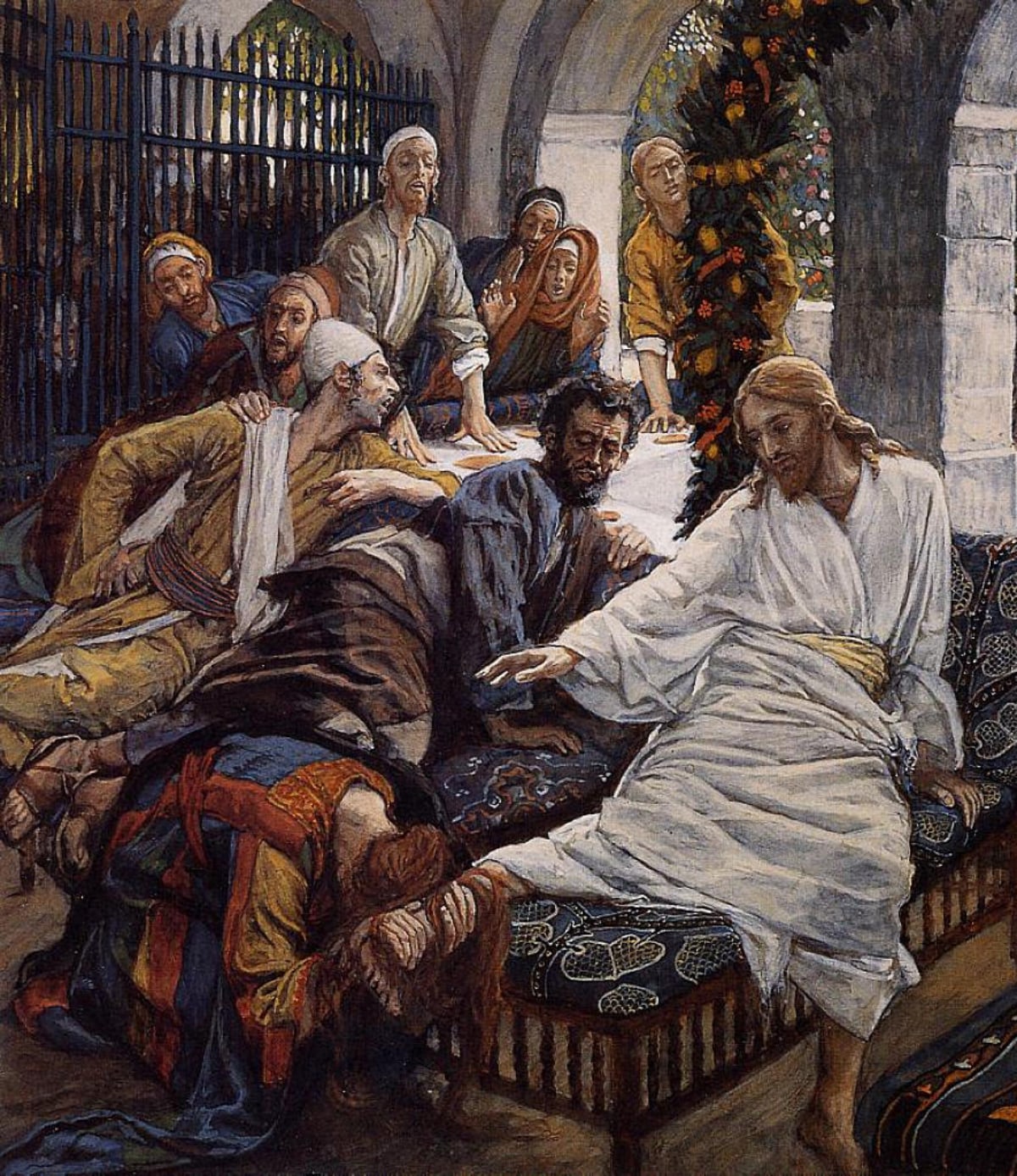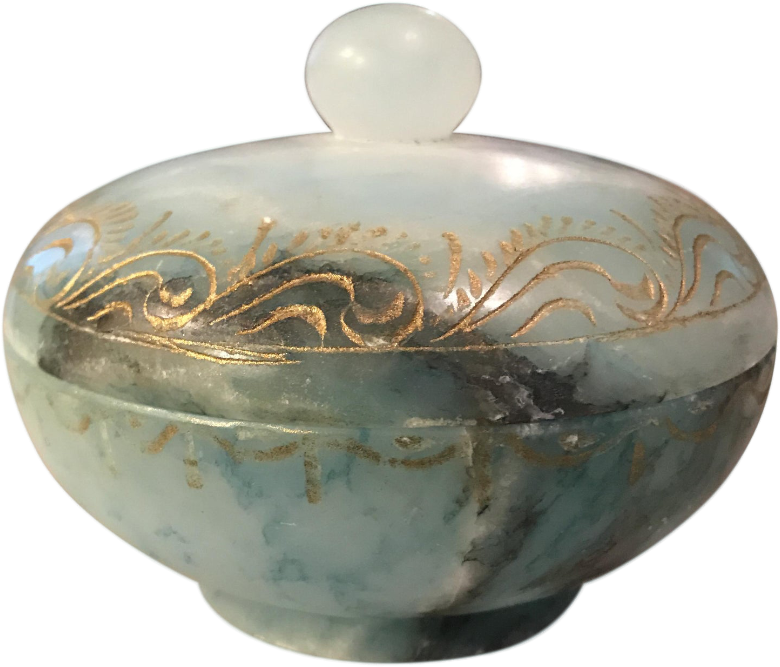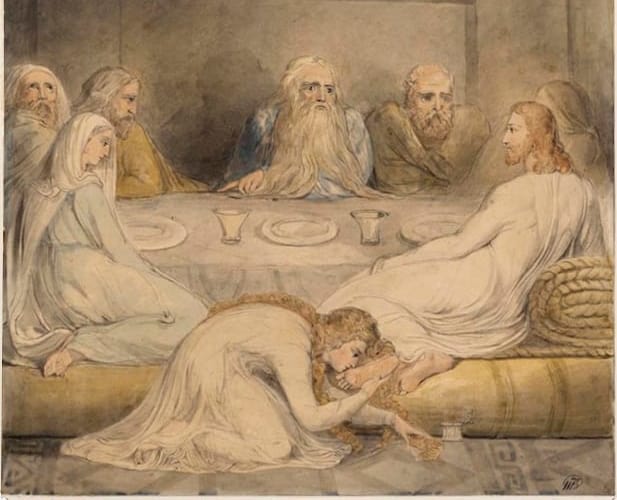
Giving and Taking by Deborah Beach Giordano
Now is the Time
 Time is growing short. The Pharisees are resentful, Pilate is suspicious, the population is restive, the feast of Passover is nearly here; Jesus knows he will soon be leaving his disciples on their own. His presence will abide with them, and the Holy Spirit will guide them, but all will soon be changed, dramatically.
Time is growing short. The Pharisees are resentful, Pilate is suspicious, the population is restive, the feast of Passover is nearly here; Jesus knows he will soon be leaving his disciples on their own. His presence will abide with them, and the Holy Spirit will guide them, but all will soon be changed, dramatically.
These are the last few days in which He will teach them, face to face. Why, with so little time left, does the Lord welcome Mary's offering of expensive oil — and make a point of refuting Judas' expressed concern for the poor?
I've always been bothered by the Gospel writer's aside about Judas, that he only cared about the money because he was a thief. Yes, Judas committed a terrible betrayal, but Jesus had called him to be a disciple, seeing something of value in the man, some potential; obviously he wasn't all bad. He must have started out as a decent guy, but then something happened. The fact of the betrayal is enough: we don't have to be further convinced of Judas' wickedness by allegations that he was a thief, a liar, a cheat, was mean to small animals, and didn't wash behind his ears.
Judas the Rat
That remark, placed where it is, seems intended to distract us; focusing our attention on what a rat Judas was, demeaning his character — rather than addressing the content of his suggestion.
 It's a classic ad hominem attack. Never mind what Judas said: he's a fink. A traitor. Utterly bad and rotten to the core from start to finish. We hate him, and we hate everything he ever said!
It's a classic ad hominem attack. Never mind what Judas said: he's a fink. A traitor. Utterly bad and rotten to the core from start to finish. We hate him, and we hate everything he ever said!
Yet imagine if Peter or Nathaniel or Thomas or any other disciple had made the same comment about the expenditure. We'd probably consider it a thoughtful, reasonable expression of charitable concern, much in keeping with our own sympathies. The perfume did represent a great deal of money; why not use it in service to the poor? Surely it would do much good thereby, instead of being poured out onto Jesus' feet — which didn't serve any practical purpose.
Practical Christianity
 It's the idea of praxis faith embodied in action. This concept has firmly staked its claim on Protestant Christianity, nearly to the exclusion of all else. No Sunday service is complete without announcements on the bulletin or from the pulpit of Action Items: things we can do “in Jesus' name.” Church buildings are festooned with banners and proclamations to the outside world — yet when do we call for a congregational day (or an hour!) of prayers for guidance that “Thy will be done”? or dedicated to pure thanksgiving — privately, personally, faithfully?
It's the idea of praxis faith embodied in action. This concept has firmly staked its claim on Protestant Christianity, nearly to the exclusion of all else. No Sunday service is complete without announcements on the bulletin or from the pulpit of Action Items: things we can do “in Jesus' name.” Church buildings are festooned with banners and proclamations to the outside world — yet when do we call for a congregational day (or an hour!) of prayers for guidance that “Thy will be done”? or dedicated to pure thanksgiving — privately, personally, faithfully?
But what else can we do, but work, work, work for the kingdom of God — since Jesus is no longer with us? We are called the Body of Christ, and it's up to us to be “the Lord's hands and feet” as one popular saying has it.
Or so we think.
But perhaps there's more to the story.
The House was Filled with the Fragrance

Which brings us back to Jesus' strange — seemingly incongruous — comment. After all this time, all of the teachings and prayers and healings and feedings, was he saying that the Kingdom will never come? That the poor will always be with us? Should we value fragrance over frugality? Are our many efforts destined to be futile; is there no point in carrying on the work of the Gospel after He has gone? Is that what Jesus is saying?
You Do Not Always Have Me
"You will not always have Me here with you.”
Jesus knows what is coming. He will be leaving soon, and his disciples must be prepared to face the many post-Easter days and months and years and, indeed, millennia while awaiting his Return. After the Lord goes to be with His Father, they're going to be on their own. Then what sort of Christ-followers will they be?
We've been told, repeatedly, that Christians are to carry on: to extend the healing grace and redemptive power of the Gospel “to the ends of the earth.” Surely, if we are to continue the work of the Gospel, the idea of using our resources for the care of the poor is absolutely spot on.
Yet Jesus defends and praises Mary's expensive offering and pointedly rebukes Judas' criticism.
As we've seen, the Gospel writer frames this as a response to Judas' character, but I have my doubts. Maybe it's not what we imagine: maybe it's not just a slap at Judas, but a cautionary statement from our Lord that those with ears may hear. Perhaps Jesus is issuing a warning to His followers about how we should carry on when He is no longer with us.
The Betrayer of Christ
 There has been, over the years, a suggested defense of Judas' actions, alleging that money wasn't the motivator, that he didn't believe that the Lord would be killed, but thought that by handing Jesus over to His persecutors he could expedite the coming of the Kingdom. If the divinely-ordained Messiah was in peril, surely God would have to intervene, call forth the heavenly host to destroy His enemies, and establish Jesus as ruler over the holy Kingdom. Immediately, without delay.
There has been, over the years, a suggested defense of Judas' actions, alleging that money wasn't the motivator, that he didn't believe that the Lord would be killed, but thought that by handing Jesus over to His persecutors he could expedite the coming of the Kingdom. If the divinely-ordained Messiah was in peril, surely God would have to intervene, call forth the heavenly host to destroy His enemies, and establish Jesus as ruler over the holy Kingdom. Immediately, without delay.
In other words, it was an attempt to coerce God to act according to Judas' will. It sounds like a version of that perennial human temptation “to be as gods,” as Judas tries to bring about his version of the Kingdom, at the time and place of his choosing. In truth, this is no defense, but the definition of a different kind of betrayal — far worse than simple greed. This is a betrayal of trust in the Lord Jesus; an attempt to subvert His timing, His methods, and His Way — and replace it with Judas' own.
It can't be considered a reasonable or wise decision by any estimation, especially there in the house of Lazarus — the living proof (!!) of Jesus' divine power and authority. But then, who among us hasn't rushed into action without adequate prayer and preparation, convinced that we know exactly what ought to be done, and when, and by whom?
There's more to being a Christ-follower than “getting with the program.” Ultimately, as we'll see, this encounter between Jesus and his disciples is a lesson about priorities and authority.
Setting the Scene
“You won't always have me,” says the Lord. It is noteworthy that this exchange takes place at the home of Lazarus and his sisters, Martha and Mary — you know: that Martha and Mary, along with Jesus' disciples.

Martha is serving — busy, as always; involved in her work. As we have seen before, her fault is not in her doing, but in the distractions. Here, too, she's apparently so caught up in tasks and chores that she does not take time to stop and listen to Jesus.
There is Judas, the betrayer, strangely at center stage: the one who speaks first, and to whom Jesus responds. Critical of Mary, resentful of her generosity, greedy for attention, unconcerned — uncaring — about Jesus; Judas is focused on his own vision, his own plans, his own way. It's as if Jesus holds no power or meaning for him; as if Jesus is of no value and might readily be disposed of. His betrayal of the Lord is simply the next logical, practical step: get that guy out of the way so that he can get on with his work.
Then there is Mary, who ministers to Jesus, blesses Him, bestows upon Him an extravagant gift (perhaps “all that she had”). Making no pretense of equal standing with the Lord, she kneels before Him, her hair uncovered and unbound; all signs of status and modesty cast aside — a genuinely embodied spirituality: Here I am, Lord; as I am: Your servant.
The Right Stuff
In his reply to Judas, Jesus tells the assembled congregation — and all with ears to hear — who has done rightly. It is the one who listens to the Lord, the one who cares for Him, the one whose attention is focused on Him, the one who treats Jesus with true Christian compassion. It is Mary who, as an ancient tradition teaches, bore “Christ's child” within her — which can be understood as carrying forth the Gospel in its “infancy.” And what better description of the work of Christian ministry than “carrying Christ” within us?
Without love of the Savior as the central, non-negotiable fact and reality of our faith, we are liable — perhaps doomed — to go astray, to stumble, to fall, to do great harm in following our own way, rather than the Way of Christ.
But if it that love is within us — there is nothing we cannot do.
Trip Hazard
 So absorbed in his doing for others, Judas forgot what was Ultimately Important: his relationship with God. To serve others can be a worthwhile activity — when done in the spirit of charity, compassion, and in the name of the Lord. The instant our good works become our works, trouble arises.
So absorbed in his doing for others, Judas forgot what was Ultimately Important: his relationship with God. To serve others can be a worthwhile activity — when done in the spirit of charity, compassion, and in the name of the Lord. The instant our good works become our works, trouble arises.
We see this in Judas: so focused on the project that he ignores the Christ. The poor are his concern — everything and everyone else are troublesome, annoying impediments. Having made it his project, Judas becomes the beneficent one, the hero, the savior — turning the focus on himself, away from Jesus..… even away from the poor themselves. Indeed, is money the only thing that can help those in need? What of hope and courage; what of their hunger for the Bread of Life? Shall we feed the body but starve the soul?
When the central focus is lost, the project becomes an end in itself, rather than an offering to God. This can be seen in the projects and programs that persist after the initial goal has been achieved, or increase and expand despite having had negligible or no impact on the problem they were meant to address. These inflated, “untethered” programs and agencies drift like so many hot air balloons .… wherever the wind blows.
As Above, so Below

The same is true in our personal lives. When we lose our connection with the Divine, we are liable to drift into trouble. No longer Gospel-oriented, we become “success” oriented: pursuing worldly fame, fortune, and popularity. And if that pesky Jesus or his troublesome Message gets in the way? Ignore Him; forget about Him. We don't need Christ or any of that annoying God-talk: we're busy getting things done. We're saving the world.
That business about loving the Lord our God, dedicating all that we have and all that we are to His service? That's … that's hard. It's not practical. It's complicated, and can be uncomfortable; it requires practice and commitment: people have to actually set aside portions of their day for prayer and praise, and for honest self-reflection. Who's got time for that? And with nothing to show for it? What's the point?
The Gospel of Mary
 Throughout this encounter, Mary is silent; stormy emotions swirl around her, yet she remains a center point of calm. Perhaps she doesn't even hear Judas' snarling criticism, focused instead on easing her Lord's suffering, assuring Him of her loving loyalty.
Throughout this encounter, Mary is silent; stormy emotions swirl around her, yet she remains a center point of calm. Perhaps she doesn't even hear Judas' snarling criticism, focused instead on easing her Lord's suffering, assuring Him of her loving loyalty.
Here, indeed, is the First Apostle, the one who understood — before his death and resurrection — that Jesus was the divinely-sent Bearer of the good news of God, the Messenger whose feet brought glad tidings of salvation, an assurance of God's gracious mercy and great power to bless, heal, and save. She saw, in this Man, the radiant outpouring of God's promise, and the path she was called to follow.
How beautiful are the feet of Him who brings good news, who announces peace, who brings glad tidings, who proclaims salvation, who tells Zion, “Your God reigns!”
~ the prophet Isaiah 52:7
In Mary's faith we see what our faith can be.
Jesus is Lord
Jesus is our Lord. That fact must be central to our faith and our hope; we are His servants. We carry forth His light, His love, His blessings, His saving grace. To forget that; to set His teachings aside, to ignore Him — to give Him lip service but not our love and loyalty — is to betray the Lord Christ, and to imperil all that we do and all that we are.

Christ's grace and peace be with you,
Deborah ✝
Suggested Spiritual Exercise
Frequently, prayerfully reflect on what God's will may be in all that you do. Set aside time every day to have a conversation with God.
A helpful question can be: “Who does this serve?” Is it to the glory of God? Beyond communal programs and projects, this is equally applicable — in fact, of greater importance — to individual, personal actions: are you giving honor and respect to God's gift of your life?